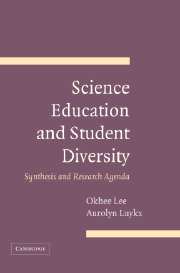Book contents
- Frontmatter
- Contents
- Foreword by Roland G. Tharp
- Acknowledgments
- Introduction
- SECTION I CONCEPTUAL GROUNDING AND POLICY CONTEXT
- SECTION II STUDENT LEARNING AND CLASSROOM PRACTICES
- 3 Students and Science Learning
- 4 Science Curriculum
- 5 Science Instruction
- 6 Science Assessment
- SECTION III CREATING EQUITABLE LEARNING ENVIRONMENTS
- SECTION IV CONCLUSIONS AND A RESEARCH AGENDA
- Appendix: Method for Research Synthesis
- References
- Index
5 - Science Instruction
Published online by Cambridge University Press: 04 December 2009
- Frontmatter
- Contents
- Foreword by Roland G. Tharp
- Acknowledgments
- Introduction
- SECTION I CONCEPTUAL GROUNDING AND POLICY CONTEXT
- SECTION II STUDENT LEARNING AND CLASSROOM PRACTICES
- 3 Students and Science Learning
- 4 Science Curriculum
- 5 Science Instruction
- 6 Science Assessment
- SECTION III CREATING EQUITABLE LEARNING ENVIRONMENTS
- SECTION IV CONCLUSIONS AND A RESEARCH AGENDA
- Appendix: Method for Research Synthesis
- References
- Index
Summary
All students come to school with knowledge constructed within their home and community environments, including their home language(s) as well as cultural beliefs and practices. Learning is enhanced – indeed, made possible – when it occurs in contexts that are culturally, linguistically, and cognitively meaningful and relevant to students. Effective science instruction must consider students' home cultures and languages in relation to the pedagogical aims of science instruction. Reviews of literature on effective instruction have focused on nonmainstream groups in general (Garaway, 1994; Lee, 2002, 2003; Lee & Fradd, 1998) as well as specific groups, including African American (Atwater, 2000), Asian American (Lee, 1996), Hispanic (Rakow & Bermudez, 1993), and Native American students (Nelson-Barber & Estrin, 1995, 1996; Riggs, 2005).
Beyond the literature on science learning, described in Chapter 3, there is a rather extensive body of literature on science instruction with nonmainstream students. Since learning and instruction are closely related, these two areas of literature are guided by common theoretical/conceptual perspectives (cross-cultural, sociopolitical, cognitive science, etc.). Within each perspective, some studies examine existing instructional practices, whereas others report on the design and implementation of instructional interventions and their impact on teachers and/or students. Although intervention efforts generally emphasize the articulation between science disciplines and some aspect of student diversity, how this articulation is carried out differs, depending on the specific points of contact and/or conflict between students' home cultures and the culture of science.
- Type
- Chapter
- Information
- Science Education and Student DiversitySynthesis and Research Agenda, pp. 72 - 91Publisher: Cambridge University PressPrint publication year: 2006



